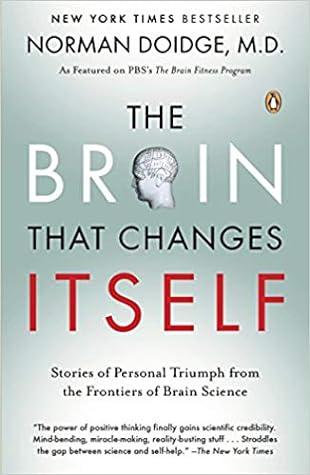More on this book
Community
Kindle Notes & Highlights
Read between
November 8, 2017 - January 31, 2018
The irony of this new discovery is that for hundreds of years educators did seem to sense that children’s brains had to be built up through exercises of increasing difficulty that strengthened brain functions. Up through the nineteenth and early twentieth centuries a classical education often included rote memorization of long poems in foreign languages, which strengthened the auditory memory (hence thinking in language) and an almost fanatical attention to handwriting, which probably helped strengthen motor capacities and thus not only helped handwriting but added speed and fluency to reading
...more
This highlight has been truncated due to consecutive passage length restrictions.
Obsessive-compulsives, so often filled with doubt, may become terrified of making a mistake and start compulsively correcting themselves and others. One woman took hundreds of hours to write brief letters because she felt so unable to find words that didn’t feel “mistaken.” Many a Ph.D. dissertation stalls—not because the author is a perfectionist, but because the doubting writer with OCD can’t find words that don’t “feel” totally wrong. When
Brain scans of OCD patients show that all three brain areas are hyperactive. The orbital frontal cortex and the cingulate turn on and stay on as though locked in the “on position” together—one reason that Schwartz calls OCD “brain lock.” Because the caudate doesn’t “shift the gear” automatically, the orbital frontal cortex and the cingulate continue to fire off their signals, increasing the mistake feeling and the anxiety. Because the person has already corrected the mistake, these are, of course, false alarms. The malfunctioning caudate is probably overactive because it is stuck and is still
...more
Nicolelis and Chapin hoped their work would help patients with various kinds of paralysis. That happened in July 2006, when a team led by neuroscientist John Donoghue, from Brown University, used a similar technique with a human being. The twenty-five-year-old man, Matthew Nagle, had been stabbed in the neck and paralyzed in all four limbs by the resulting spinal cord injury. A tiny, painless silicone chip with a hundred electrodes was implanted in his brain and attached to a computer. After four days of practice he was able to move a computer cursor on a screen, open e-mail, adjust the
...more
An operator is selected by competition. The operator theory appears to draw on the theory of neuronal group selection developed in 1987 by Nobel Prize winner Gerald Edelman, who proposed that for any brain activity, the ablest group of neurons is selected to do the task. There is an almost Darwinian competition—a neural Darwinism, to use Gerald Edelman’s phrase—going on all the time between operators to see which ones can most effectively process signals from a particular sense and in a particular circumstance.
Someone presented with an overwhelming auditory task, such
as memorizing Homer’s Iliad, might blindfold himself to recruit operators usually devoted to sight, since the vast operators in the visual cortex can process sound. In Homer’s time, long poems were composed and passed from generation to generation in oral form. (Homer, according to tradition, was himself blind.) Memorization was essential in preliterate cultures; indeed, illiteracy may have prompted people’s brains to assign more operators to auditory tasks. Yet such feats of oral memory are possible in literate cultures if there is sufficient motivation. For centuries Yemenite Jews taught
...more


